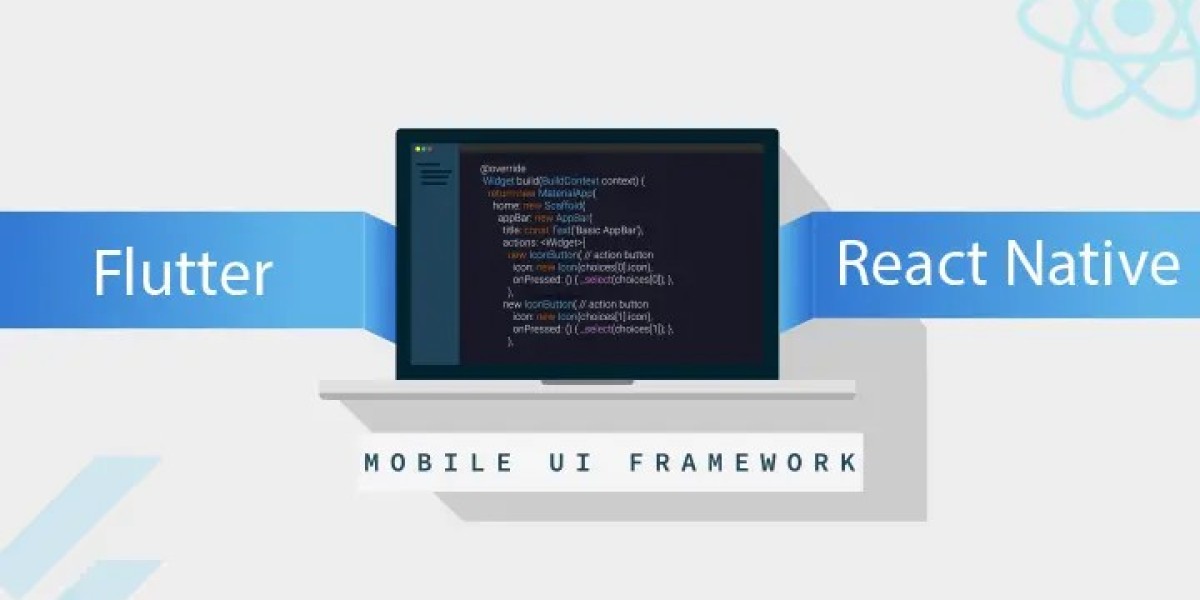If you're considering turning your app idea into reality and are drawn to cross-platform development, you're in the right place. Hiring Flutter developers India can be a strategic move for achieving your goals efficiently. With numerous responsive design frameworks to choose from, selecting the appropriate one is paramount for successful mobile application development.
Today, we are talking about two popular open-source frameworks of our time that are winning over the developer’s community, Flutter and React Native. Reactive performances, code usability on different platforms, and reusable blocks of User Interface are some of the reasons to pick one of these frameworks.
What is Flutter?
Flutter has emerged as a game-changer in the mobile app development industry. Flutter is also an open source Software Development Kit developed by Google for designing premium native interfaces on IOS & Android. It uses Google’s language, Dart. Similar to JavaScript, it has an optional built-in type of safety support. It works with existing code that has been created by participants and organizations around the world.
What is React Native?
Facebook created React Native as an open-source framework for cross-platform mobile applications. It was launched to create a real and native rendering mobile app. As a mixture of JavaScript and XML-esque markup language, it comes with the potential to manage both iOS and Android apps with a single code base.
Both of these frameworks come with their own set of advantages and limitations. We have categorized it into 10 points. Let’s check a detailed Flutter vs. React Native comparison for a bright idea.
1. Release date
Facebook released React Native in 2015, so, by now, it is already a mature tool and has a huge community.
Whereas, Google started Flutter in 2017 and slowly started seeing the colossal adaptation.
Flutter & React Native search on Google trends
Stack Overflow representation of React Native & Flutter questions
2. Stateful hot reloading
Hot reloading is something in which developers write codes, save the code, and hit reload on a mobile app (react mobile app) and reload like a webpage.
Both Flutter and React Native include hot reloading, which is super fast compared to how other native apps recompile in XCode and Android Studio. If there is any error, developers can experiment and fix bugs in no time.
However, it is easy to make changes to a Flutter app while it is running.
3. Language
Flutter uses Dart as a programming language which is easy to understand for Java developers as it supports most of the object-oriented concepts.
React Native uses JavaScript as a programming language. A vast community of programmers are already working on JavaScript so migrating into React Native is much easier for them rather than learning a whole new Dart programming language.
4. Component
In Flutter, developers get tons of open-source components designed by the Google team. It comes with everything needed to quickly render the UI, including widgets for material design and Cupertino.
Whereas in React Native, developers get many built-in components as the core framework offers just UI rendering and device access APIs. However, developers can create any of the components by using third-party libraries.
5. Documentation
Flutter documentation is very well-written which developers can easily understand. Though this doesn’t mean that the flutter documentation is impressive, in React Native, the developers have to look into third-party documentation.
6. App look
How closely does your app look like the native app designed on Swift or Java?
Though there are components that look like iOS, a lot of components developed with Flutter look like material.
In react native, once the developers write the components, it automatically adopts for either iOS or Android, and developers don’t have to write code anymore. Your app looks very closely like its native app
7. Community
Huge tech companies back both frameworks. However, Google is doing many activities to grow Flutter’s community including an event like Flutter Live.
React Native came up first in the market, so by now, it enjoys excellent support from a mature community of developers and contributors.
8. Industry adaptation
The industry has slowly started adopting Flutter; however, it has to come up with impressive features to make a mark.
On the other hand, many companies are already using React Native. Industry adaptation is quite huge for React Native; this also builds up a lot of job market in React Native world.
9. Stability
Though established tech communities well manage both of the frameworks. Recently, Google launched Flutter 1.2 which comes with improved tools that offer a more stable performance than the previous alpha version.
React Native since its inception has been popular among developers and is valued for its reliability in the industry. It is quite a stable framework from earlier.
Summarizing the attribute differences
Which framework suits your needs?
Flutter allows overwriting codes, so when your developer plans to recycle codes, flutter allows reusability. It also allows easy testing of your project. There are a lot of third-party packages for Flutter, and the increasing community discussion regarding the framework is beneficial. With more than 30k Github stars, it is making its mark on the cross platform mobile app development.
Considering the attributes, React Native offers the best result combining the qualities of both hybrid and native frameworks. If you're considering building a mobile app and seeking a proficient team to handle the development process, it's essential to explore your options thoroughly. One viable avenue is to hire Flutter app development company. Though React Native allows for the reuse of its code, it is restricted to a few components.
However, if you're looking for a framework with a broader range of third-party packages to enhance the usability of your app with dynamic features, React Native could still be a compelling choice. With its impressive track record, boasting 68k GitHub stars and leveraging the familiarity of JavaScript and the React library, React Native remains a smart choice for mobile app development.
The choice of framework is generally made depending on the project type, its requirement, the owner’s budget, the deadline, and many more factors. You must leverage the support of your mobile app development team to find the best solution for your app idea.
Well, in the meantime you can check our other blogs for better software knowledge.
Also, read React vs Ionic for a better understanding.



